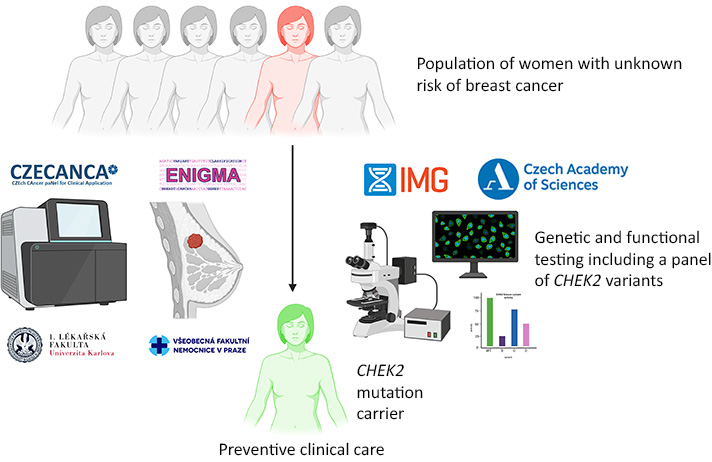Scientists have succeeded in describing the importance of hundreds of inherited mutations in the CHEK2 gene in the development of breast cancer. The research team was led by Zdeněk Kleibl from the 1st Medical Faculty of Charles University and Libor Macůrek from the Institute of Molecular Genetics of the Czech Academy of Sciences (IMG). The CHEK2 gene has long attracted attention of clinical geneticists. It is the third most frequently affected gene associated with intermediate risk of breast cancer in the Czech Republic. Some of its inherited mutations expose carriers to almost 30 % lifetime risk of the disease.
However, the presence of many other variants of the CHEK2 gene has so far prevented reliable quantification of the risk for most women who carry this mutation. “In our laboratory at the Institute of Molecular Genetics of the Czech Academy of Sciences, we have developed a unique experimental procedure that has allowed us to evaluate hundreds of previously unclear variants of the CHEK2 gene,” explains Lenka Stolařová.
The new methodology allowed the analysis of CHEK2 gene variants captured in cancer patients from all over the world in a model system in cell cultures. “Thanks to this, we were able to distinguish between pathogenic CHEK2 variants contributing to breast cancer and functionally insignificant variants that do not affect this risk,” adds Libor Macůrek.
“Thanks to the joint efforts of the national CZECANCA consortium and the international ENIGMA consortium, we have been able to screen more than 80,000 patients from twelve countries and demonstrate that the newly described risk variants of the CHEK2 gene are present in approximately 0.5% of all women with breast cancer,” explains Petra Kleiblová from the General University Hospital in Prague, who, together with Zdeněk Kleibl, leads the CHEK2gether project of the ENIGMA consortium. The results of the large-scale interdisciplinary collaboration have been published by the prestigious journal Clinical Cancer Research.
Breast cancer is the most common type of cancer in women. It can affect about one tenth of women in our population and therefore represents a major social problem. Some cancers are caused by hereditary traits. Thanks to the development of genetic testing in recent years, it has become increasingly successful in finding patients at increased risk of developing breast cancer and enrolling them in prevention or early detection programmes when the disease can be defeated. The most well-known examples of hereditary breast cancer are mutations in the BRCA1 and BRCA2 genes, which cause the disease in 60-80% of carriers. However, in addition to mutations in these genes, there are a number of other, less well-studied inherited variants that increase the risk of breast cancer. The main benefit of the study will be to improve the quality of care for women with CHEK2 gene mutations not only in the Czech Republic, but worldwide.

Stolarova L, Kleiblova P, Zemankova P, Stastna B, Janatova M, Soukupova J, Achatz MI, Ambrosone C, Apostolou P, Arun BK, Auer P, Barnard M, Bertelsen B; Biobank Japan; Blok MJ, Boddicker N, Brunet J, Burnside ES,Calvello M, Campbell I, Chan SH, Chen F, Chiang JB, Coppa A, Cortesi L, Crujeiras-González A; Consortium CZECANCA; De Leeneer K, De Putter R, DePersia A, Devereux L, Domchek S, Efremidis A, Engel C, Ernst C, Evans DGR, Feliubadaló L, Fostira F, Fuentes-Ríos O, Gómez-García EB, González S, Haiman C, van Overeem Hansen, Hauke J, Hodge J, Hu C, Huang H, Ishak NDB, Iwasaki Y, Konstantopoulou I, Kraft P, Lacey J, Lázaro C, Li N, Lim WK, Lindstrom S, Lori A, Martinez E, Martins A, Matsuda K, Matullo G, McInerny S, Michailidou K, Montagna M, Monteiro ANA, Mori L, Nathanson K, Neuhausen SL, Nevanlinna H, Olson JE, Palmer J, Pasini B, Patel A, Piane M, Poppe B, Radice P, Renieri A, Resta N, Richardson ME, Rosseel T, Ruddy KJ, Santamariña M, Dos Santos ES, Teras L, Toland AE, Trentham-Dietz A, Vachon CM, Volk AE, Weber-Lassalle N, Weitzel JN, Wiesmuller L, Winham S, Yadav S, Yannoukakos D, Yao S, Zampiga V, Zethoven M, Zhang ZW, Zima T, Spurdle AB, Vega A, Rossing M, Del Valle J, De Nicolo A, Hahnen E, Claes KBM, Ngeow J, Momozawa Y, James PA, Couch FJ, Macurek L, Kleibl Z: ENIGMA CHEK2gether Project: A Comprehensive Study Identifies Functionally Impaired CHEK2 Germline Missense Variants Associated with Increased Breast Cancer Risk. Clinical Cancer Research (2023) 29 (16): 3037–3050. [pubmed] [doi]
Image Credits – Breast Cancer Image was created with BioRender.com.